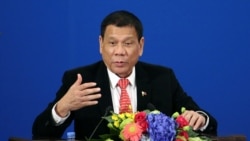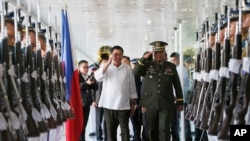On Philippines’ President Rodrigo Duterte’s recent state visit to China, he proclaimed that America had “lost” him and that “in this venue, I announce my separation from the United States.” To a room that erupted in applause, the so-called “Punisher” from Davao also claimed that it was China, the Philippines and Russia against the world and it was “the only way.”
In the Philippines, Duterte’s calls for “separation” from the U.S. resonated with with some, which led to protests against the United States.
Renato Reyes, a leftist leader and political activist, organized roughly 1,000 individuals on October 19 for a rally in front of the U.S. Embassy in Manila.
"We have to understand the reason why the people were protesting,” said Reyes, the secretary general of the New Patriotic Alliance. “This had to do with U.S. troops. This had to do with U.S. bases, U.S. military facilities and military exercises. So to be able to resolve that, the president will have to make true his commitment to say goodbye to the U.S. in terms of the VFA (Visiting Forces Agreement), the EDCA (Enhanced Defense Cooperation Agreement), the Mutual Defense Treaty and all other unequal agreements."
The protest turned violent when a police van rammed through the assembled group. According to Reyes, at least three were hospitalized and 23 arrested.
U.S. Assistant Secretary of State for East Asian and Pacific Affairs, Daniel Russel, was in Manila and discussed what he called the “succession of controversial statements.”
"For our part,” he said, the United States remains a "steady, and I hope trusted partner, strong ally. We stand ready to honor our commitments. We stand by international law and we stand by the Philippines."
President Duterte took to the podium in his hometown of Davao to clarify the remarks he made in China, stating that it wasn’t a “severance of ties,” but rather he was simply “charting a new course.”
Philippine Foreign Secretary Perfecto Yasay, Jr. further clarified, "There is a continuing need for us to make sure that we get to talk to each other and try to resolve whatever differences and clarifications that will have to be made, and I have committed myself to that, because it is very important that we continue to also talk to make sure that there will be no misunderstanding on how our friendship and our strong relations would proceed."
While in Japan, Duterte continued to send mixed messages when he announced that he’d like see to the Philippines free of foreign troops, noting that if he had to “revise or abrogate agreements, executive agreements, I will.”
Filipino reactions
From the Philippine city of Cebu, Lorna Bondoc, a local businesswoman, told VOA by phone that she saw a brighter horizon with Duterte’s pivot.
“Overall, I think the president’s trip to Beijing is beneficial in establishing and stabilizing bilateral ties, ushering in an environment supporting the economic agenda. Overall, yeah, I think it’s going to be beneficial economically for us in terms of investment setting aside the military or the territorial dispute,” said Bondoc.
Eddie, a 29-year-old computer science graduate who didn’t want his last name used, said, “In my view, it will be basically good for us. He is trying to develop relations with China. So I think it will give us benefit. Basically in my view, it will help with our independence. Perhaps in the long run, it will be for the betterment, but it will take a lot of sacrifices.”
However, Bondoc was unsure what lasting effects may manifest if President Duterte follows through on his plans.
“If it is true that the country (the Philippines) disengages from the U.S., it could be detrimental for the Philippines if we should shift to China or Russia,” said Bondoc who works in an industry where a large portion of her clients are in the United States. “Personally, I don’t think the Philippines is ready to go against the world… So it’s a question whether the country is ready for it and willing to embrace it or not,” Bondoc added.
The United States and the Philippines will meet in late November for their annual discussions about the upcoming year - something that may provide clarity to Duterte’s often contradicting comments.








